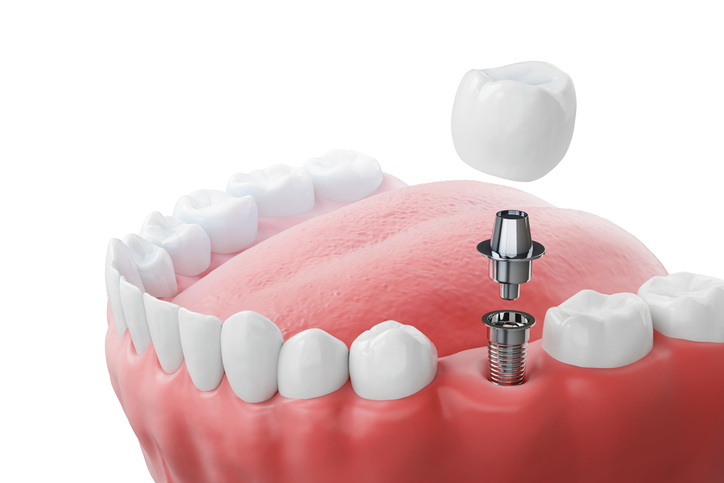
Dental implants are becoming more and more popular as a long-term solution for missing teeth. Their natural look, durability, and ability to restore full functionality make them a desirable option for many patients. In this blog post, we’ll address the top 10 most common questions about dental implants. If you’ve been on the fence about whether implants are right for you, read on!
1. What Exactly Are Dental Implants?
Think of a dental implant like a replacement “root” for a missing tooth. It’s usually made of titanium, a material that can fuse with your jawbone over time. This fusion process, called osseointegration, gives you a stable foundation for a new tooth (the crown) that looks and acts like the real deal.
In a typical dental implant setup, you’ll have three parts: the implant post (the titanium “root”), the abutment (a connector), and the crown (the visible, tooth-like cap). Once everything heals, you can chew, talk, and smile confidently without worrying about your tooth shifting or coming loose.
If you’ve had dentures or bridges, you know they can sometimes slip or need frequent adjustments. Implants, on the other hand, are meant to feel and function just like your natural teeth—giving you a stronger, more permanent solution to missing teeth.
2. How Long Do Dental Implants Last?
Dental implants are known for their durability. When cared for properly, they can last for many years—even a lifetime in some cases. This makes them a long-term investment in your oral health and overall quality of life.
Of course, nothing lasts forever if it isn’t cared for properly. Regular brushing, flossing, and check-ups are important. You’ll also want to pay attention to habits like smoking, which can affect the health of your gums and bones and can shorten the lifespan of your implants.
The good news? With consistent oral care and routine visits to a skilled periodontist like Dr. Scharf, your implants have an excellent chance of standing the test of time. It’s all about giving them the best environment to thrive.
3. Are Dental Implants Painful?
If you’re anxious about pain, you’re certainly not alone. But here’s the reassuring part: most people find that getting a dental implant is less uncomfortable than they expected. You’ll receive local anesthesia during the procedure, so you shouldn’t feel much beyond some pressure.
Afterward, you might experience mild soreness or swelling for a few days. Over-the-counter pain relievers can usually help manage any discomfort. Many patients compare the recovery to having a tooth pulled—manageable and short-lived.
If you’re someone who feels especially nervous about dental procedures, don’t hesitate to let Dr. Scharf know. He offers dental sedation that helps you feel relaxed or general anesthesia so you sleep through the whole procedure.
4. How Much Do Dental Implants Cost?
Cost is a big question for most people considering dental implants, and it’s understandable. Implant pricing can vary based on how many teeth you’re replacing, whether you need extra procedures like a bone graft, and the materials used. The average cost of a single dental implant in Long Island, NY, is $3000 – $6000. While it can seem higher than alternative solutions, remember that implants are designed to be a long-term solution.
A big plus with implants is that, unlike dentures or bridges, they don’t need frequent replacements or adjustments. Over time, you’re likely to save money by avoiding those ongoing costs. Think of it as investing in something you’ll use daily—like a reliable car, but for your smile!
Insurance coverage can be hit or miss, depending on your plan. Dr. Scharf’s office offers payment plans to make implants more accessible. It’s always a good idea to check with your insurance provider and talk to Dr. Scharf’s team about options that suit your budget. We even help you get the most out of your dental insurance. Let us help:
- Check with your dental coverage carrier to find out what your yearly maximum is and how much you have left.
- Bring your benefits book with you to your appointment, if possible.
- We will complete all paperwork and submit claims to your insurance company.
- We can spread out your dental procedures to maximize your annual dental benefits.
Our financial coordinator is always available to assist you in obtaining the full benefits to which you are entitled under your dental benefit plan.
5. Who Is a Good Candidate for Dental Implants?

You don’t need to be a superhuman to qualify for dental implants, but you do need reasonably healthy gums and enough jawbone to support the implant. If you’ve lost a lot of bone over time, a bone graft might help build it back up before implant placement.
General health matters, too. Conditions like uncontrolled diabetes or certain autoimmune disorders can slow healing, but they won’t necessarily rule out implants if they’re well-managed. Lifestyle habits like smoking can also affect the success rate, so it’s worth discussing any concerns with your dentist.
Ultimately, the only way to know for sure is to have a thorough exam, including X-rays or 3D imaging. Dr. Scharf will review your dental and medical history to create a treatment plan that’s just right for you. It’s a team effort to ensure your implants have the best shot at success.
6. Is the Implant Procedure Safe?
Yes, dental implant procedures are generally very safe and have one of the highest success rates in modern dentistry—often cited around 95% to 98%. That said, every surgery carries some level of risk, like infection or nerve damage, but these complications are relatively rare.
Key factors for success include the skill of your periodontist, your own health, and how well you follow aftercare instructions. Preparation and planning make a huge difference, too. A detailed consultation with Dr. Scharf helps rule out issues that could interfere with healing.
If you still feel anxious, just know that technology and techniques in implant dentistry have come a long way. When performed by an experienced specialist in periodontology like Dr. Scharf, the process is carefully orchestrated to minimize risks and maximize your comfort.
7. How Long Does the Dental Implant Process Take?
Planning ahead is crucial with dental implants because they don’t happen overnight. After your implant is placed in the jaw, you’ll usually wait a few months for it to fuse with your bone. This healing period sets the stage for a stable, long-lasting foundation.
Once your implant is well-integrated, you’ll come back for the abutment and finally the crown (the visible part). If you need bone grafting or other preliminary procedures, that can extend the timeline a bit. While it might seem like a long road, remember that patience leads to the best, most reliable results.
Some patients may qualify for “immediate” or “same-day” implants, but that depends on factors like bone density and overall oral health. Dr. Scharf will discuss all possible timelines with you, so you’re never left in the dark about what comes next.
8. Will I Need a Bone Graft for Dental Implants?
The need for a bone graft depends on the state of your jawbone. If you’ve been missing a tooth for a while, the bone underneath might have begun to shrink. Grafting helps rebuild that bone so it’s strong enough to support an implant.
Bone grafting involves adding either synthetic bone, donor bone, or even your own bone from another area in your body. The graft integrates with your existing bone over a period of weeks to months, creating a solid base for the implant.
Not everyone needs this step, but if you do, don’t worry—it’s a routine procedure. Dr. Scharf can walk you through what to expect, recovery tips, and how this extra step will ultimately give you the best chance for a successful implant.
9. What Is Recovery Like After Getting Dental Implants?
Recovery from dental implant surgery is often smoother than you might think. Sure, there might be some swelling, tenderness, or minor bleeding, but most people manage just fine with over-the-counter pain relievers. You might even feel ready to go back to work the next day, depending on the complexity of your surgery.
For the first few days, you’ll want to stick to softer foods and avoid putting too much pressure on the implant area. Good oral hygiene is crucial—gently brush and floss around the surgical site, and consider using an antibacterial mouth rinse if recommended.
Everyone’s healing timeline is a bit different, so listen to your body. If something feels off, or if you have significant pain or swelling, it’s best to reach out to our dental team. Dr. Scharf is there to guide you through every step and make sure your recovery goes smoothly.
10. How Do I Take Care of Dental Implants?
Maintaining dental implants is surprisingly similar to taking care of natural teeth—think daily brushing, flossing, and regular check-ups. You don’t need fancy gadgets unless your dentist suggests them, though interdental brushes or water flossers can be super helpful for keeping the hard-to-reach areas clean.
Keep an eye out for any signs of gum inflammation, like redness or bleeding. Even though implants aren’t susceptible to cavities the way real teeth are, the surrounding gums and bone still need TLC to stay healthy.
Routine professional cleanings are still a must. Your dentist or periodontist will make sure everything looks good below the surface and can address any minor issues before they become big problems. With the right care, your dental implants can easily last for years—possibly even a lifetime.
Ready to Explore Dental Implants with Dr. Scharf?
If you’re looking to restore your smile and think dental implants might be the answer, Dr. Scharf can help make that goal a reality. As a highly trained periodontist, he has the expertise to guide you through every step of the process—from the initial evaluation to the final crown placement.
Ready to take the next step? Learn more about Dr. Scharf and schedule your consultation. You deserve a confident, healthy smile, and we’re here to help you achieve it!
